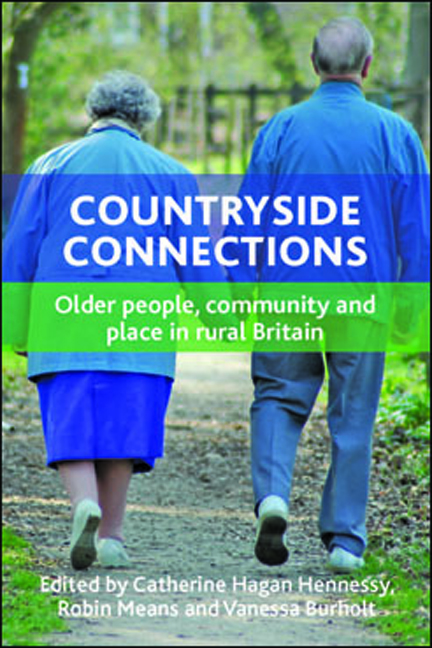Book contents
- Frontmatter
- Contents
- List of tables and figures
- Acknowledgements
- Notes on contributors
- Foreword
- one Countryside connections in later life: setting the scene
- two Conceptualising rural connectivities in later life
- three Rural connectivity and older people’s leisure participation
- four Connecting with community: the nature of belonging among rural elders
- five Beyond transport: understanding the role of mobilities in connecting rural elders in civic society
- six Deep mapping and rural connectivities
- seven Older people, low income and place: making connections in rural Britain
- eight Connecting with older people as project stakeholders: lessons for public participation and engagement in rural research
- nine Towards connectivity in a Grey and Pleasant Land?
- Index
one - Countryside connections in later life: setting the scene
Published online by Cambridge University Press: 04 March 2022
- Frontmatter
- Contents
- List of tables and figures
- Acknowledgements
- Notes on contributors
- Foreword
- one Countryside connections in later life: setting the scene
- two Conceptualising rural connectivities in later life
- three Rural connectivity and older people’s leisure participation
- four Connecting with community: the nature of belonging among rural elders
- five Beyond transport: understanding the role of mobilities in connecting rural elders in civic society
- six Deep mapping and rural connectivities
- seven Older people, low income and place: making connections in rural Britain
- eight Connecting with older people as project stakeholders: lessons for public participation and engagement in rural research
- nine Towards connectivity in a Grey and Pleasant Land?
- Index
Summary
Introduction
The purpose of this chapter is to describe the background and guiding interdisciplinary framework of a programme of research on ageing in rural areas of the UK that forms the basis of this book. The topic of this research is older people's participation in rural community life, in particular, the ways in which rural elders are connected to their communities and their contributions to rural civic society. This focus brings together a number of established and emerging strands of gerontological interest – the social inclusion (and exclusion) of older people; their support networks; financial security; leisure participation; availability and access to services; transport and mobility; civic engagement in later life; and digital inclusion – all considered within the rural context. In this chapter, we outline the aims and organisation of this volume, highlighting the broad interdisciplinary approach that informed our study of how and in what ways older people are connected to civic society and their rural settings. We term these links ‘connectivity’, and the nature and impact of older people's connectivities in rural communities form a thread that integrates the various disciplinary perspectives and elements of the research described in the chapters that follow.
Rural ageing in the UK context
Despite increasing urbanisation globally, it has often been estimated that more than 60% of the world's older population live in rural areas (Hermanova et al, 2001). In the majority of countries, it has been noted that rural areas continue to be disproportionately elderly (Kinsella, 2001) and the growth of the older segment of the population is occurring faster in rural than in non-rural settings. Worldwide, 9.7% of rural populations are aged 60 and over; in Europe, this figure is 22.9%, which is greater than the proportion of their counterparts (19.1%) living in urban areas (United Nations, 2009). Contemporary rural Britain reflects this demographic picture (Brown, 2010). Rural England is at the forefront of the demographic ‘age wave’, with a median population age in 2006 of 44.4 years, compared with 38.5 years in urban areas (Commission for Rural Communities, 2007, 2008); this is expected to increase to 50 years in rural areas over the next 25 years (Champion and Shepherd, 2006). Moreover, median age is increasing faster in rural than in urban locations, and rural communities, particularly smaller ones, now have higher proportions of people in the 40–64 and 65 and over age groups than do urban areas.
- Type
- Chapter
- Information
- Countryside ConnectionsOlder People, Community and Place in Rural Britain, pp. 1 - 30Publisher: Bristol University PressPrint publication year: 2014



